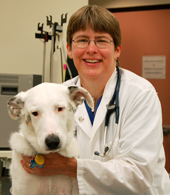AMES, Iowa -- If Fido's breath knocks you over, Tabby shuns her dry food or Bunny drools to excess, your pet may need some serious dental care.
Chances are your dog, cat, rabbit, guinea pig, horse and other companion-animal creature will need some kind of dental intervention during its lifetime, says an Iowa State University veterinarian. Some pets will require cleanings only, others need extractions and a few may benefit from a root canal or even (yes, it's true) orthodontics.
Pet owners may not understand why veterinarians recommend regular dental cleaning for pets. But oral health has a remarkable impact on the overall physical health of an animal, says Dr. Kim Langholz, a community practice veterinarian at the ISU Veterinary Teaching Hospital.
"The mouth has a tremendous blood supply. An animal with tartar, gingivitis, periodontal disease and fractured teeth has large numbers of bacteria that can enter the blood stream and spread throughout the body," Langholz said. "These organisms can cause problems with the valves of the heart, leading to murmurs and increased work load for the heart. Bacteria also could damage the animal's liver and kidneys."
Severe periodontal disease generally results in the loss of teeth. The condition of your pet's mouth also can influence behavior, she said.
"If a tooth is painful or has an infected root, a dog may be protective of its head and snap at people who try to pet it. And any pet with chronic pain or discomfort in its mouth may lose interest in eating, playing and exercising," Langholz explained.
Ideally, an animal has one or two physical examinations annually that include an oral exam. The veterinarian looks for tartar, gingivitis, fractured teeth, oral masses and, in cats, resorptive lesions of the teeth.
"If your veterinarian recommends a dental cleaning, remember that pets won't sit in the chair and say 'Aaaahhhhhh' while the teeth are cleaned," said Langholz. "Animals have to be asleep for most dental procedures."
While the pet sleeps, the teeth are cleaned and polished, and fluoride treatments are applied. Many veterinary clinics also take dental X-rays to better evaluate the roots of the teeth and to determine which teeth may need to be removed.
"Once the teeth are clean, you can help maintain your pet's oral health by brushing its teeth, using a dental rinse developed for companion animals and feeding special diets and/or treats that help delay plaque and tartar accumulation," Langholz said.
"Prevention really is critical," she said. "Brushing your dog's or your cat's teeth will help decrease the buildup of plaque on the teeth and maintain healthier gums."
Langholz recommends starting early. Teach a new puppy or kitten to accept having its mouth examined and treated. Adult pets can learn to accept oral health care treatments, too.
"Talk with your veterinarian about how to train your older pet to accept dental care," she said. "Do not risk a bite! Start slowly and try to make it a pleasant experience. Gradually, your pet will most likely accept having its teeth cleaned."
Langholz recommends the following supplies to keep on hand.
- Gauze or a lightweight washcloth
- Finger brush or pet toothbrush. Children's toothbrushes are usually too firm and not angled properly to fit in your pet's mouth.
- Pet toothpaste. Your pet won't rinse and spit, so use a product that is safe for your pet to swallow.
- Oral rinse
- Special diet/treats to help remove plaque and tartar buildup
